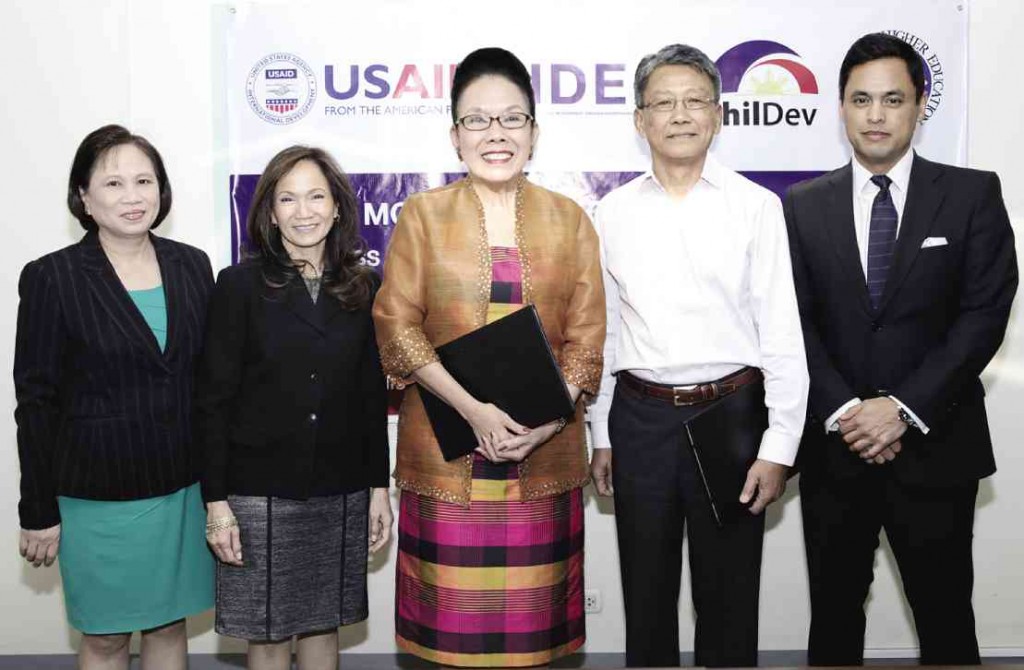
Partners push the Idea program forward. From left: CHEd Director Amelia Biglete, USAID Mission Director for the Philippines Gloria Steele, CHEd Chair Dr. Patricia Licuanan, PhilDev Chair Diosdado Banatao, and PhilDev Executive Director Alexis Kayanan.
MANILA, Philippines–The idea is to turn classroom nerds into successful entrepreneurs and help the Philippines become the next Silicon Valley.
For Dado Banatao, chair of the Philippine Science and Technology Development Foundation-Manila Inc. (PhilDev), the country’s growing economy may get an even bigger boost through technology.
Banatao, also known as the Philippines’ “Father of Semiconductors,” believes that, with the right innovation and solution, Filipino engineering students may help push the country’s development by coming up with value-added technology to take to the global market.
“It’s hard to access the global market without value-added products. You cannot expect a leverage of the global market unless you use technology-based products. [That is why] we have to work with the academe,” he explains.
Already, the Commission on Higher Education (CHEd) has committed to a program that will combine science and technology with entrepreneurship.
This fresh approach to science and technology courses was then presented by PhilDev.
The program is called Innovative Development through Entrepreneurship Acceleration (Idea). It is a three-year joint venture of PhilDev and the United States Agency for International Cooperation (USAid).
Now on its second year, Idea continues to raise the entrepreneurial competence of Filipino engineering students whose capabilities are not being maximized.
“This signifies CHEd’s readiness to meet this challenge,” CHEd chair Patricia Licuanan says. “We hope, through this collaboration, we will be able to instill to our college students the entrepreneurial know-how and spirit to turn their skills and knowledge into SMT products, businesses and ventures.”
Under the program, entrepreneurship learning will be embedded in the universities’ curricula. Pretrial interventions will be initiated in five institutions: Mapua Institute of Technology, UP Los Baños, University of San Carlos, Xavier University and Technological Institute of the Philippines.
The program kicked off with the Idea Global Entrepreneurship Symposium late February at the Radisson Blu Hotel in Cebu City. The workshop series held at the main campus of the University of San Carlos, also in Cebu City, covered such topics as market demands, strategic planning and modeling, market needs, competitive analysis, and strategic IP approach for startups, among other things.
Some of the invited lecturers were entrepreneurs from Silicon Valley: Ahmet Alpdemir and Eros Resmini.
“We have different programs to make technology our main driver for economic growth. And one of course is building foundation for scientists and engineers,” Banatao says.
However, Banatao understands that not too many science enthusiasts are ready to embrace the marketing side of the course. He says that there may be some who do not want to take the risk because startups have a high probability of failure.
But if you make it, it can be very rewarding,” he says, explaining that only certain types of personality may be willing to take risks in the things they do.
Licuanan says that, with the program, they may be able to shape the students to become “successful business nerds” someday.
“They don’t just stay in the labs. They don’t just remain nerds. They become successful business people as well. We hope this will boost our national competitiveness and create jobs for our people,” she adds.